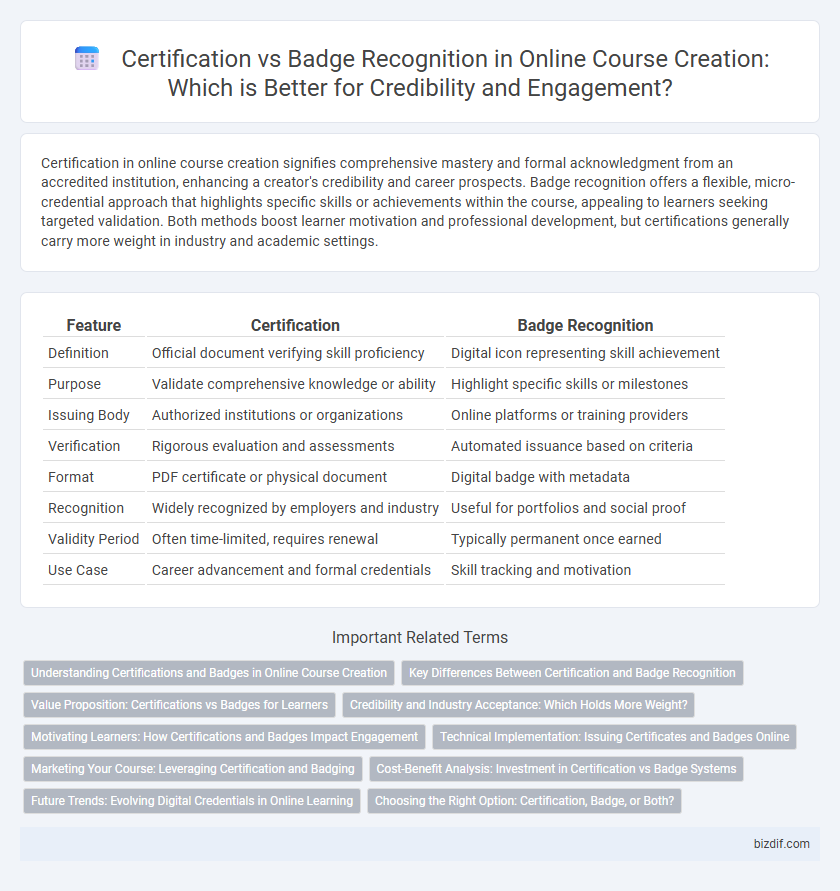Certification in online course creation signifies comprehensive mastery and formal acknowledgment from an accredited institution, enhancing a creator's credibility and career prospects. Badge recognition offers a flexible, micro-credential approach that highlights specific skills or achievements within the course, appealing to learners seeking targeted validation. Both methods boost learner motivation and professional development, but certifications generally carry more weight in industry and academic settings.
Table of Comparison
| Feature | Certification | Badge Recognition |
|---|---|---|
| Definition | Official document verifying skill proficiency | Digital icon representing skill achievement |
| Purpose | Validate comprehensive knowledge or ability | Highlight specific skills or milestones |
| Issuing Body | Authorized institutions or organizations | Online platforms or training providers |
| Verification | Rigorous evaluation and assessments | Automated issuance based on criteria |
| Format | PDF certificate or physical document | Digital badge with metadata |
| Recognition | Widely recognized by employers and industry | Useful for portfolios and social proof |
| Validity Period | Often time-limited, requires renewal | Typically permanent once earned |
| Use Case | Career advancement and formal credentials | Skill tracking and motivation |
Understanding Certifications and Badges in Online Course Creation
Certifications in online course creation serve as formal validation of learner competence, often issued by recognized institutions and requiring comprehensive assessment criteria. Badges function as digital symbols representing achievements or skills acquired, offering micro-credentials that motivate learners through incremental recognition. Understanding the distinction between certifications and badges is crucial for course creators to design effective credentialing strategies that enhance learner engagement and career value.
Key Differences Between Certification and Badge Recognition
Certification typically requires completion of a comprehensive course or assessment demonstrating mastery over a subject, often involving rigorous evaluation and validity periods. Badge recognition represents specific skills or achievements within smaller learning modules and can be earned incrementally, usually displayed digitally with metadata verifying the issuer and criteria. Certifications are generally more formal and widely recognized in professional settings, while badges provide flexible, micro-credentialing useful for showcasing targeted competencies.
Value Proposition: Certifications vs Badges for Learners
Certifications offer learners a formal, widely recognized validation of skills, often required for career advancement and professional credibility. Badges provide micro-credentials that showcase specific competencies or achievements, offering flexibility and motivation through incremental recognition. Both serve unique purposes; certifications establish authority while badges encourage continuous learning and skill diversification.
Credibility and Industry Acceptance: Which Holds More Weight?
Certification often holds more weight in terms of credibility and industry acceptance due to its rigorous assessment criteria and formal recognition by accredited institutions. Badges, while flexible and easily shareable on digital platforms, may carry varying degrees of recognition depending on the issuing organization's reputation. Employers and industry professionals tend to prioritize certifications for demonstrable expertise and standardized validation in online course completion.
Motivating Learners: How Certifications and Badges Impact Engagement
Certifications and badges serve as powerful motivators by providing learners with tangible proof of achievement, boosting engagement and commitment in online course creation. Certifications often signify comprehensive mastery and carry formal value, encouraging learners to complete courses thoroughly and enhance their professional credibility. Badges offer micro-credentials that recognize incremental progress, maintaining continuous motivation through visible milestones that encourage ongoing participation and skill development.
Technical Implementation: Issuing Certificates and Badges Online
Issuing certificates and badges online requires integrating secure digital platforms that support verifiable credentials using blockchain or encrypted QR codes. Certificate issuance often involves generating PDF files with unique serial numbers and secure signatures, while badges utilize Open Badge standards to embed metadata and evidence of skills earned. Implementing APIs from credentialing services like Accredible or Badgr enhances automation, tracking, and learner verification to ensure authenticity and prevent fraud.
Marketing Your Course: Leveraging Certification and Badging
Certification and badge recognition enhance course credibility by providing tangible proof of learner achievement that can be showcased across professional networks like LinkedIn. Utilizing certifications in marketing materials boosts enrollment by appealing to career-driven individuals seeking formal acknowledgment of their skills. Digital badges offer micro-credentials that encourage continuous learning and social sharing, amplifying organic course promotion through user-generated endorsements.
Cost-Benefit Analysis: Investment in Certification vs Badge Systems
Investing in certification systems typically involves higher costs due to rigorous assessment, accreditation, and administrative expenses but offers substantial benefits such as increased credibility and learner motivation. Badge recognition systems, while more cost-effective and scalable, deliver immediate visual proof of skills and micro-achievements that enhance learner engagement and continuous education. Conducting a cost-benefit analysis helps online course creators determine whether the long-term value of formal certification outweighs the flexibility and affordability of badge systems for their target audience.
Future Trends: Evolving Digital Credentials in Online Learning
Emerging trends in online course creation emphasize the shift from traditional certification to dynamic badge recognition, which offers granular skill validation and enhanced learner motivation. Digital credentials are evolving to incorporate blockchain technology, ensuring authenticity and portability across platforms, which aligns with employer demands for verifiable competencies. Future-facing online learning ecosystems will increasingly adopt micro-credentials and stackable badges, enabling personalized pathways and continuous professional development.
Choosing the Right Option: Certification, Badge, or Both?
Certification provides formal recognition of comprehensive skills and knowledge, often requiring rigorous assessments, while badges offer micro-credentials that highlight specific competencies or achievements within a course. Selecting the right option depends on the learning objectives, target audience, and industry standards, with certifications favored for professional validation and badges suited for motivating incremental progress. Offering both certification and badges can enhance learner engagement and credential value by combining broad expertise recognition with focused skill acknowledgment.
Certification vs Badge recognition Infographic

 bizdif.com
bizdif.com